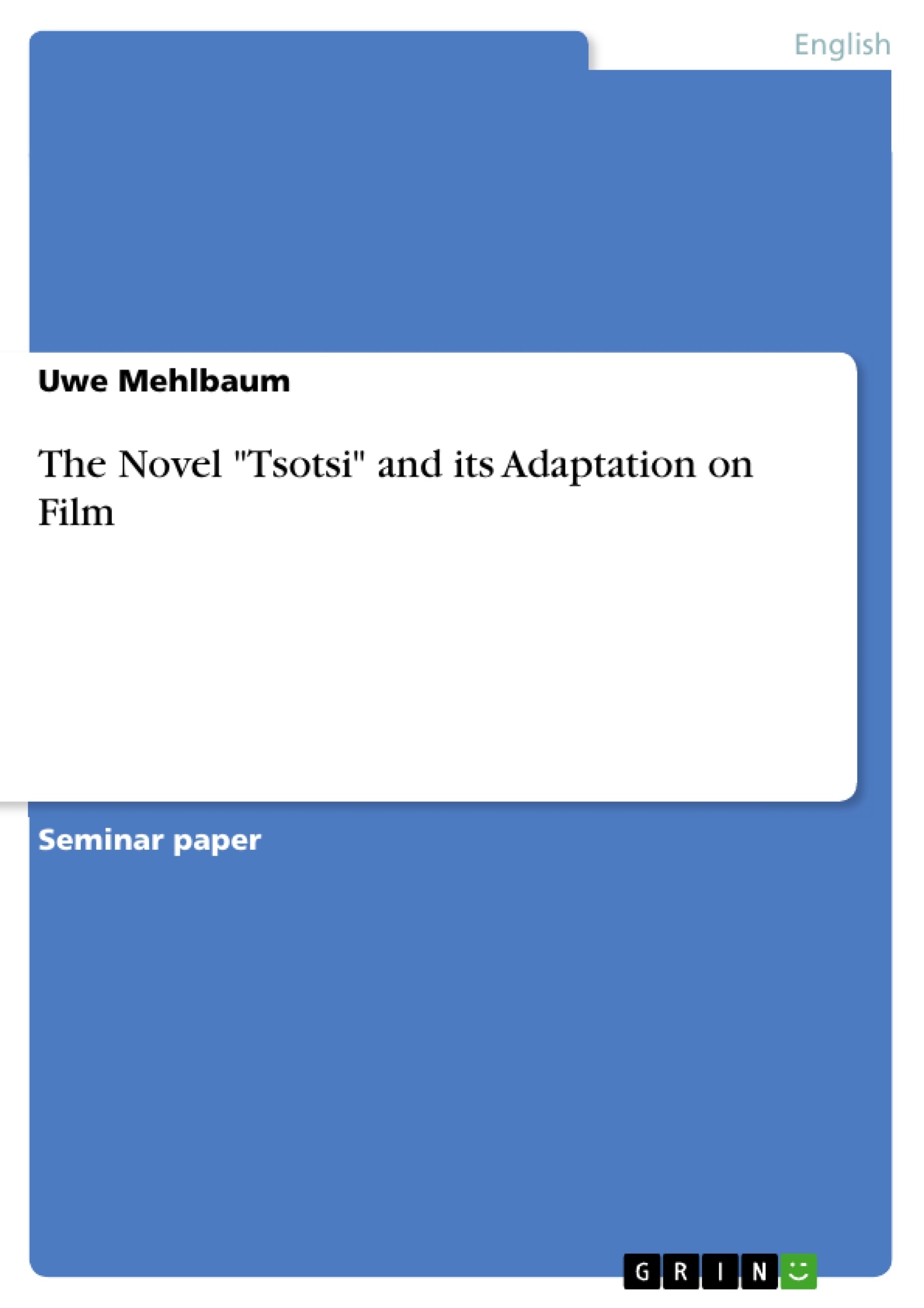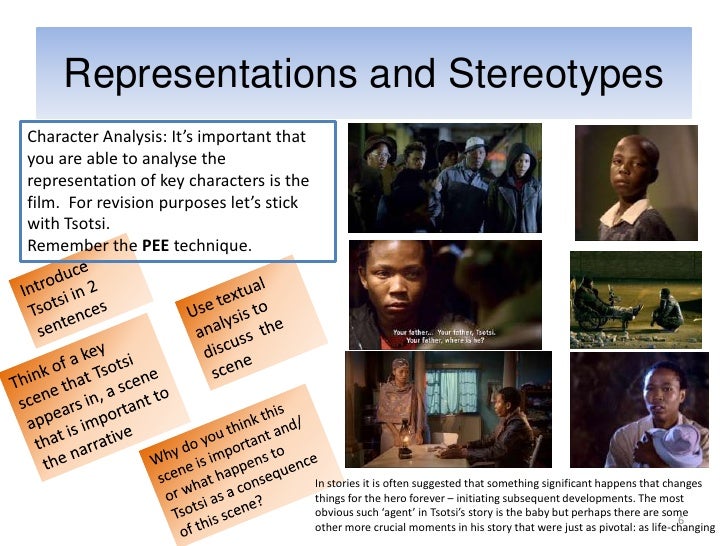Tsotsi Character Analysis
Tsotsi

Before the novel takes place, David Madondo is an innocent ten-year old boy. As the grandmother figure describes David: “‘ten years – you haven’t ever been born to the troubles of this world” (146). He is unaware of Apartheid because he is protected my his caring mother, who awaits his father’s return.
After the night of the raid – where David witnesses his mother being taken away, his father kicking his dog, and the yellow bitch and her pups dying – he runs away and is taken in by the river gang. With his new gang, and the many gangs to follow, he learns harsh lessons about sympathy and compassion being a weakness, how not to feel the pain you inflict, and not to remember. He becomes Tsotsi. He becomes corrupt. He’s corrupted by the violence he sees, and the indifference for the pain he causes. Nevertheless, his gang is his brotherhood; where they rely on each other despite the violence and instability in their lives.
Tsotsi is a film that features a number of characters that one way or another represent aspects of THE MOTHER figure. As you watch the film consider the ways in which Motherhood is represented. Tsotsi Character Study NCEA Level 3 English video. Ended up getting a merit grade, and also good reactions from other students in school. Uploaded this video. People like Mathabane’s parents work all week and struggle to survive. On payday, tsotsi s (gangsters) come to extort some of their money. Over the weekends, black people in Alexandra. (full context) Chapter 8.Alexandra with a “gang” of boys between six and eight years old. A supportive character who lives near Tsotsi in the slum. Tsotsi's real name. The police investigator within the film. Gumboot Dlamini. The rich man who got attacked by Tsotsi's gang on the train.; Subjects. Arts and Humanities.
After Tsotsi receives the baby, he has brief flashbacks from his past. When he stalks Morris, the cripple reminds him of the yellow bitch. This creates sympathy for Morris. As Tsotsi realizes he doesn’t have to kill, he becomes proactive in remembering. He changes from a predator when he steps out of the darkness and into the light of the street lamp. he becomes a man. He starts to have feelings; he starts to have a past.
Tsotsi returns to the ruins to find the baby covered in ants. Instead of instinctively running away from the crisis, he stays to rescue the baby. Tsotsi starts to show compassion. He begins to see the value in life.
When Tsotsi remembers his past, he ends up breaking his three rules: looking into the black abyss, asking questions, and acting with violence. He remembers the innocent boy he was and how he was pushed into violence. He becomes accepting of his past, and tries to make retribution for his actions. He begins to ask questions about his change, so he seeks out Boston.

Tsotsi Character Analysis Theory
While Tsotsi cares for Boston so he can ask him questions, he becomes a mother, he becomes a father, to Boston, and little David. The bread symbolizes the breadwinner – the father – and the milk represents the mother’s love. Boston assures Tsotsi he must accept his change, and it is God who made him change; consequently, Tsotsi goes in search of God.
Tsotsi talks with Isaiah to learn about God. Isaiah reveals God is everywhere, especially in the church, and doesn’t approve of sinners. When he asks Tsotsi to go to church, Tsotsi says yes. This shows Tsotsi’s commitment to change; he begins to live a life of goodness and not sinning, so he will not resort to violence. Because of this, he is redeemed for his sins, for his past.
Tsotsi then goes to Miriam so she can feed little David. Tsotsi learns Miriam has been yearning for her husbands return, but this has made her bitter. Because of little David, she realizes she must let him go; therefore, Tsotsi realizes he must let his past go, and focus on the future. He becomes forgiving. He also learns from watching Miriam caring for his and her baby that mother’s do love there children. He comes to trust in love.

Because of what he realizes from Miriam, Tsotsi becomes David Mondondo. He is valiant, decent, and self-sacrificing; this is shown when he instinctively sprints to save the little David from the soon to be, demolished ruins. When he is uncovered after his heroic efforts, his smile shows his pride in his actions, and the new, ethical person he has become.
Isaiah
Isaiah is a young man in the service of the church who is oppressed by the white landlord of the church grounds. His name means salvation which is symbolic because he saves Tsotsi from his past by inviting him to return to the church to be cleansed of his sins. He has a mental disability which causes him to slur his words and makes it difficult for him to focus on his tasks.
Boston
Boston is an intelligent man who was on his way to graduating top of his class when an accused rape stripped him of his pride and sent him into a life of crime. He is an ethical man who does not bode well with the more violent jobs the gang participates in. Because of his curious nature he is beaten by Tsotsi for his questions. Tsotsi retuns and rescues him and he helps Tsotsi discover why he is changing and how to cope with it and redeems himself for his past mistakes.
Morris
Morris is a cripple who lives by Terminal Place. He lost his legs six years ago in a mineshaft collapse. Now he is shameful he has to beg to survive; he loses his dignity. He believes he is a half-man. No better than a dog. Yet he does what he has to in order to survive; meanwhile, he contemplates why he continues living. When Tsotsi’s gang goes to the city, Tsotsi decides he will kill Morris; however, he feels sympathy for the cripple because he reminds him of the yellow bitch. When he realizes Tsotsi’s plot, he is frightened and shameful he has to flee, not fight back like a full man. He asks Tsotsi, before is about to kill him, “why do you have to kill?” Tsotsi reflects and realizes: “I don’t have to.” Morris helps Tsotsi remember, especially his name, and feel sympathy for others. Also he reminds Tsotsi mothers love their children.
Miriam
Miriam is an eighteen year old woman with a six month year old baby, Simon. Her husband, Simon, left her eight months ago for work, and never returned. In hope of his return, her milk has gone sour. While feeding Tsotsi’s baby, little David, she realizes Simon is dead, never coming back, and she must take care of herself and her baby. Miriam is someone who nurtures, nourishes, saves, and forgives. She is like Mother Mary. Through their relationship of her feeding little David, Tsotsi understands the importance of leaving the past behind, living for the future, the value of a mother’s love, and that mothers do love their children. Since Tsotsi doesn’t give up the baby when Miriam asks to take him, Tsotsi becomes like her: a mother, a parent, a caretaker.
Little David
The baby is given to Tsotsi, in the bluegum trees, by a frightened woman, at the beginning of the novel. The baby catalyzes Tsotsi remembrance of his past, and his shift in character by being the first thing he has to take responsibility for. Tsotsi goes to find milk for the baby, and cleans the baby; this shows he becomes compassionate, responsible, and merciful. When he rescues the baby from the ant infested ruins, Tsotsi begins to value life. To keep the baby alive, he finds a mother, Miriam, to properly feed and clean him. This allows him to later come to the realizations he must let his past go, and mother’s love their children. When he names the baby David, he realizes that the baby is a symbol for himself, and that is why he cares for the baby. Tsotsi’s rebirth as David is proven when he sacrifices himself in the attempt to save little David from the soon to be bulldozed ruins. The baby redeems Tsotsi; therefore, he can change and become an ethical man. He also is a savior by redeeming Tsotsi because he saves many victims, like Morris, that he would have killed.
Die Aap
Given is name because he, to the gang looks like an animal, has long arms and is very strong. He is one of the gang members and is a boy who to others is seen as a threat. Because of the way he walks around and looks, people don’t take this boy to easily. He is older than Tsotsi but will still look up to Tsotsi. He sometimes scares Tsotsi because Die Aap is a very strong human being that sometimes can get a little aggressive. Because of being so strong, he is the real power house of the group so when they attack their enemies or even attack their prey, he will be the heavy hitter. Die Aap was involved with Butcher in a huge part of raping Rosie while they were at Soekie’s place having some alcohol. Die Aap is very loyal though; after Tsotsi beats up Boston, he goes to Tsotsi asking about the gang and says it has been his brotherhood for the past two years. He is upset when Tsotsi dismembers the gang.
Tsotsi Character Analysis Text
Buthcer
Tsotsi Character Analysis
We can say that this gang member who is in with Tsotsi plays a huge role when it comes to killing their prey because he never misses his attack. He puts his attacks right where he wants them and he can kill someone so quick because of doing this. He played a very huge role when the gang attack Gumboot because he was able to strike Gumboot to weaken him and eventually kill him. He too was a part of raping Rosie at Soekie’s place. Him and Die Aap seem to be near each other the most because them too get along and are like “clash brothers.” Them two together are a package when it comes to striking their prey and killing who they want. Butcher is: persistent with attacks, has the best aim, and helps out a ton with Boston and Tsotsi.